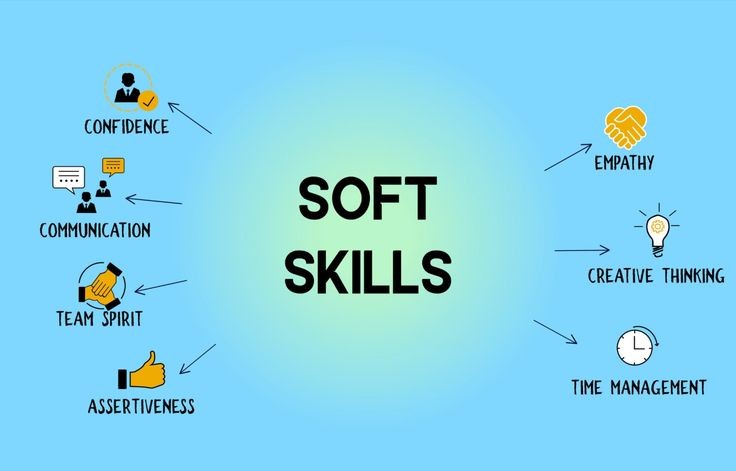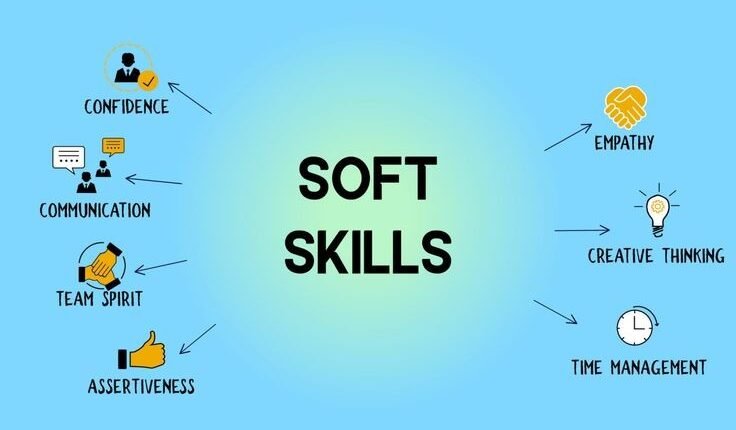Skills are the learned ability to act with determined results, good execution, often within a given amount of time. Skills are of domain-specific as people need a broad range of skills to contribute to the modern economy. One among all the skills required for the growth of the economy is Soft skills. Soft skills are crucially important skills that employers seek and can be a key factor in determining success in many jobs and careers. While technical skills and qualifications are important, they are often not enough to succeed in the workplace.
Employers look for individuals who can communicate effectively, work well in a team, manage their time effectively, solve problems and adapt to new situations. These soft skills are often intangible and difficult to quantify. They can make a significant difference in an individual’s ability to succeed in a job.

What are soft skills?
Including soft skills on a resume can help employers get a better sense of your overall abilities and potential and can help set you apart from other candidates with similar technical skills and qualifications. Overall, having strong soft skills can greatly enhance your career prospects and make you a valuable asset to any organization.
Why are soft skills important?
When employers look at your resume, they’re looking for certain qualities and personality traits that assure them that you will thrive in their workplace. Soft skills show them that you will get along with your coworkers, managers, customers, clients, vendors and anyone you interact with. This will also show the employer that you can do your job.
Yet, the scope of these skills goes beyond your interactions. Here are some additional benefits of soft skills:
- Soft skills are transferable: You can use your soft skills across any industry, unlike hard skills, which have a limited scope. For example, the customer service skills from your days as a server can help you perform during client meetings as an architect.
- Soft skills can improve your performance: Your technical skills can be on an expert level, but soft skills, like adaptability and innovation, can take your work to the next level.
- Soft skills increase your productivity: Soft skills can help you be a better worker — and coworker! Knowing how to collaborate, follow instructions and resolve conflicts can make a difference in your work environment.
- Soft skills will prepare you for the future of the workplace: A.I. technology, like machine learning, natural language processing, robotics and more, will continue to take over the workplace. In a work environment where machines know how to perform jobs, your humanly soft skills, like emotional intelligence and conceptual thinking, will help you stand out.
Top soft skills examples
According to the Society for Human Resource Management, these are the most in-demand soft skills. We have also included a related soft skills list for each of them so you can tailor them to the job you’re applying for and include them in your resume and cover letter.
Dependability
Employers want to know that they can trust you to finish the job on time. They can’t always have eyes on you, so knowing that they can ask you to do something and that you’ll do it makes dependability a crucial soft skill in any job. Being dependable means that you have built trust with your manager or team members, that you hold yourself accountable and that the people around you can rely on you.
Teamwork
Great candidates can lead, but they can also fall in line, take direction and support their teammates when they need to – even if you’re working remotely. This can be a tricky soft skill to prove on a resume, but you’ll stand out if you can use your past accomplishments to highlight how you’ve worked alongside others and successfully finished projects together.
Problem-solving
The ability to solve problems quickly, effectively and creatively is a soft skill many employers highly value. You might have shown problem-solving skills when you had to use your industry knowledge to find a quick solution to an issue or when you were tasked with something that required research to solve a problem.
Flexibility
Do you handle stress well? Can you easily pivot from one task to another? Flexibility is a great soft skill to have under your belt, as it shows you can adapt to sudden changes without getting too overwhelmed. A great way to include this soft skill in your job application is by providing an example of when you handled a sudden change of plans.
Critical thinking
Not many people can analyze a situation, identify the issue and make an informed decision, making this soft skill highly sought after by employers. Whether you’re writing an information technology resume or a food service resume, hiring managers want to know that you can understand a problem, think critically and come up with a solution.
Communication
Effective communication is a key component of any job. For many recruiters and hiring managers, communication remains the most critical soft skill for a resume and with good reason – it’s how we share ideas, connect and learn from each other. This soft skill goes beyond speaking clearly. It’s also about listening to others, being empathetic and understanding nonverbal cues.
Creativity
Being a creative thinker goes beyond having an imagination. This valuable soft skill is an excellent tool for thinking of different strategies to solve problems, developing new ideas and even paving the way to develop technical and hard skills that fall under the creative arts (like copywriting or painting). A creative person looks at things from a different perspective – which might just be what an employer needs.
How to develop soft skills
You can develop soft skills through diverse channels. Don’t limit yourself to just one approach. Variety will help you find out the best way to learn and improve. Taking this step will positively impact your career.
Work on your habits:
Soft skills can start as habits you’ve nurtured throughout your life, not just your career. Improving them can help you make better choices in your job. For example, improving your morning routine can help you create a better list of tasks and priorities for the day; working on your manners can improve rapport with your colleagues. Practice your new and improved habits every day.
Self-evaluate your performance:
Write down the soft skills that you need to work on. Create a plan with a timeframe to improve them. Not sure how to self-evaluate? You can research online for a self-assessment tool to help.
Ask for feedback:
Your coworkers will know other soft skills you must learn. Ask them where they see potential for improvement and examples of how you haven’t done as well in the past. Use this information to create a plan for improvement.
Reach out to a mentor:
If you have a mentor in the workplace or from your studies, ask their opinions on your work. If you’ve met expectations, where they see room for improvement, and how to achieve it. No mentor? You can contact a membership organization from your industry, a previous manager, or ask if your workplace offers a mentorship program.
Use traditional learning resources:
Seek learning resources to build your weakest soft skills and improve your strongest soft skills. A few examples of resources to use are courses through Massive Open Online Courses (MOOC) and higher learning extension schools, training and workshops. Another tool on the rise in soft skills learning is gamification. It is the approach by Duolingo which help its user learn a new language.
Be flexible and consistent in learning soft skills. Unlike the traditional education and experience approach to hard skills, learning soft skills is not as clear-cut. Here are a few ways you can evaluate your improvement:
- Self-evaluate your progress after a reasonable amount of time; think three months or six months.
- Reconvene with a mentor to discuss your previous plans, the results, and the next steps to continue improving.
- Request feedback from managers and colleagues every so often to determine if your effort is working as intended.

